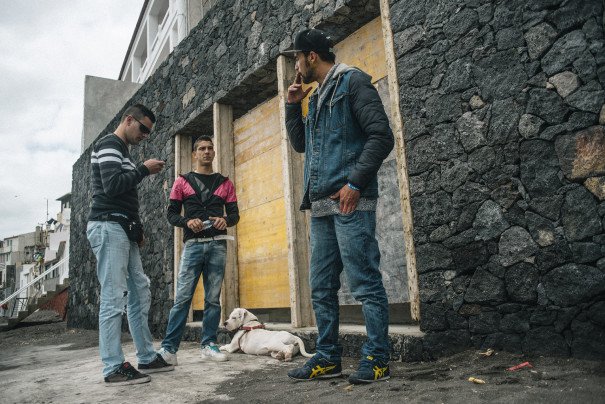
Having a Beer With the Only Rapper in São Roque

Having a Beer With the Only Rapper in São Roque
Cruzcampo on São Miguel
The island of São Miguel is the largest in the Azorean archipelago—a cluster of Portuguese islands dotted in the middle of the Atlantic Ocean—but in all other ways it’s a small place. A short drive down the coast from the capital, Ponta Delgada, is the fishing village of São Roque. It’s beautiful, with a streak of volcanic black sand at the sea front and alleyways between pastel-colored houses leading you up the hillside towards pastures full of miniature cows.
There are a few tourists who’ve come to surf and bodyboard and a handful more locals, mostly unemployed youngsters hanging out on the bonnets of battered hatchback cars smoking weed. The Azorean fishing industry is centuries old, but in the past few decades it’s crumbled. Commercial fishing stocks have plummeted, with the total catch declining by over half in the past five years. In the struggling Portuguese economy, jobs of all kinds are few and far between.
Diogo’s felt that struggle more than most. In his past he’s experienced crime, drugs, poverty, and the tragic suicide of his mother. For work, he’s hauled packages as an errand boy in a warehouse and served as a waiter in a port-side restaurant. But not any more. Now he’s a full time rapper.
We’re sitting at a table outside São Roque’s P3 café, overlooking the water. There’s a bottle of Cruzcampo in front of me (the only beer anyone drinks on São Miguel) and a coffee in front of Diogo, who prefers to go by his stage name, Swift Triiga, and doesn’t tend to touch alcohol these days. “I only smoke weed and hash,” he says.
Diogo’s spent all his life in São Roque. We’re a few meters away from the house where he lives with his dad, which in turn is just a stone’s throw from his grandma’s house, and his uncle’s beyond that. The community is close-knit, and as young Azoreans wander in and out of the café they all greet Swift. “That’s Billy,” says Diogo, pointing out a particularly wayward-looking teen. “He’s a cool kid. He hangs with us. But he’s into some shit.” By “shit” he means heroin. In São Roque some of the boats have found another purpose. “They use the fish to hide the drugs,” Diogo explains.
As Swift Triiga, Diogo raps about what he calls, “real stuff–the streets.” It’s hard to imagine any turf wars breaking out on São Roque’s picture-postcard-pretty streets, but Diogo’s verses (always in Portuguese, though his English is good) do resonate with the locals. He’s got a following. A group of girls approach us, giggling, and Diogo explains to them—with some pride—that he’s doing an interview. A few thousand hits for the two-dozen songs on Swift Triiga’s YouTube channel might not seem like a lot, but this is sleepy São Miguel, and Diogo’s the only rapper in São Roque.
Soon he’ll be playing the biggest show of his life at the island’s one and only music festival, Tremor. For Diogo, the show’s a symbol of how far he’s come. ‘I’m starting over again. Getting my mind right,’ he says, sipping on his espresso. It was the death of his mother when he was 21 that really knocked Diogo off course. “I was playing PlayStation with my brother,” he remembers. ‘My mum came up to say we needed some money, 200 euros to pay the bills. Twenty minutes later I heard my dog in the back yard, barking, barking, barking. I was like, damn motherfucker. When I went to the kitchen I saw her through the window. She’d put a hosepipe around her neck and hanged herself.”
Diogo blamed the anti-depressants his mother was on for her death, which is why he refused to take them himself in the aftermath. Instead he turned to street-level drugs. “I wasn’t depressed, just angry about life,” he says. “But my dad didn’t want his son to be a junkie.” Whether or not he makes it in the rap game, music’s been Diogo’s redemption, and with his dad coming to see his show tomorrow, he feels an infectious sense of nervous excitement. If this were 8 Mile, this would be Diogo’s one shot.